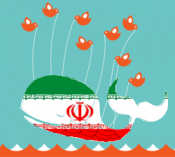 The Department of State sent on Tuesday, December 15,  a report to Congress under section 1606 of the Iran-Iraq Arms Non-Proliferation Act of 1992 (codified at 50 U.S.C. § 1701 note)(“IIANPA”). Under section 1603 of  IIANPA, no items on the Commerce Control List can be exported to Iran. However, section 1606 gives the President the authority to waive that restriction 15 days after a report to Congress explaining in detail why the waiver is in the interest of U.S. national security.
The Department of State sent on Tuesday, December 15,  a report to Congress under section 1606 of the Iran-Iraq Arms Non-Proliferation Act of 1992 (codified at 50 U.S.C. § 1701 note)(“IIANPA”). Under section 1603 of  IIANPA, no items on the Commerce Control List can be exported to Iran. However, section 1606 gives the President the authority to waive that restriction 15 days after a report to Congress explaining in detail why the waiver is in the interest of U.S. national security.
The report set forth the national security rationale as follows:
Personal internet-based communications are a vital tool for change in Iran as recent events have demonstrated. However, U.S. sanctions on Iran are having an unintended chilling effect on the ability of companies such as Microsoft and Google to continue providing essential communications tools to ordinary Iranians. This waiver will authorize free downloads to Iran of certain nominally dual-use software (because of low-level encryption elements) classified as mass market software by the Department of Commerce and essential for the exchange of personal communications and/or sharing of information over the internet. The waiver will enable Treasury’s Office of Foreign Assets Control [“OFAC”] to issue a broader general license covering these downloads and related services.
The report leaves open several interesting questions. First, what services does it cover? Just Microsoft and Google’s instant messaging services or other communications services such as Twitter and YouTube? The State Department report talks about export of certain software to Iran (assuming apparently that allowing the download of software is an export rather than a provision of a service). However, it says nothing about services not involving downloads.
Twitter and YouTube don’t require any downloads. Twitter and YouTube both provide services to Iranians by providing a unique URI to each Iranian Tweeter (n., from geekspeak, a person who uses Twitter; a Twitterer) or YouTuber. But the IIANPA only requires a sanction on exports of goods, not services, so OFAC is presumably free to issue a general license allowing access to the Twitter and YouTube services to ordinary Iranians, and it seems reasonable to suppose that is about to happen given the State Department letter’s reference to a “broader general license covering these downloads and related services.” (Compliance question: how is Twitter to know that “tedintehran” isn’t actually Mahmoud Ahmadinejad’s twitter ID?).
The second question is what about other sanctioned countries? Shouldn’t their ordinary citizens have access to these communications technologies as well? This is a more complicated question and depends on the extent to which those countries are subject to legislatively imposed sanctions. The Syria Accountability and Lebanese Sovereignty Restoration Act of 2003 has similar provisions as the IIANPA relating to exports of dual-use items to Syria and also provides a mechanism for a Presidential report to Congress to waive application of those mandatory sanctions. Without a similar report from the State Department on Syria, the restrictions on instant messaging and internet communications technologies such as Twitter and YouTube will remain in place, although there doesn’t seem to be any good reason to treat ordinary Syrians any differently from ordinary Iranians in this regard.
 Permalink
Permalink
Copyright © 2009 Clif Burns. All Rights Reserved.
(No republication, syndication or use permitted without my consent.)

 Posted by
Posted by  Category:
Category: 

